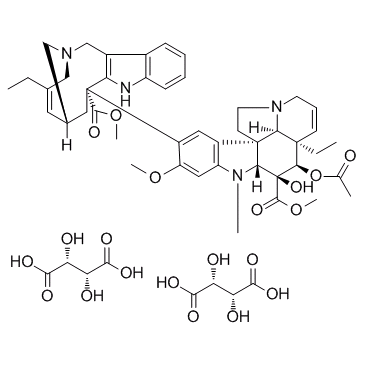125317-39-7
| Name | vinorelbine L-tartrate |
|---|---|
| Synonyms |
methyl (2β,3β,4β,5α,12β,19α)-4-(acetyloxy)-15-[(12S,14R)-16-ethyl-12-(methoxycarbonyl)-1,10-diazatetracyclo[12.3.1.0.0]octadeca-3(11),4,6,8,15-pentaen-12-yl]-3-hydroxy-16-methoxy-1-methyl-6,7-didehydroaspidospermidine-3-carboxylate bis(2,3-dihydroxybutanedioate) (salt)
aspidospermidine-3-carboxylic acid, 4-(acetyloxy)-6,7-didehydro-15-[(6R,8S)-4-ethyl-1,3,6,7,8,9-hexahydro-8-(methoxycarbonyl)-2,6-methano-2H-azecino[4,3-b]indol-8-yl]-3-hydroxy-16-methoxy-1-methyl-, methyl ester, (2β,3β,4β,5α,12β,19α)-, 2,3-dihydroxybutanedioate (1:2) (salt) MFCD03613607 methyl (3aR,4R,5S,5aR,10bR,13aR)-4-(acetyloxy)-3a-ethyl-9-[(12S,14R)-16-ethyl-12-(methoxycarbonyl)-1,10-diazatetracyclo[12.3.1.0.0]octadeca-3(11),4,6,8,15-pentaen-12-yl]-5-hydroxy-8-methoxy-6-methyl-3a,4,5,5a,6,11,12,13a-octahydro-1H-indolizino[8,1-cd]carbazole-5-carboxylate bis(2,3-dihydroxybutanedioate) (salt) Methyl (2β,3β,4β,5α,12β,19α)-4-acetoxy-15-[(12S,14R)-16-ethyl-12-(methoxycarbonyl)-1,10-diazatetracyclo[12.3.1.0.0]octadeca-3(11),4,6,8,15-pentaen-12-yl]-3-hydroxy-16-methoxy-1-methyl-6,7-didehydroaspidospermidine-3-carboxylate 2,3-dihydroxysuccinate (1:2) Vinorelbine Ditartarate methyl (2β,3β,4β,5α,12β,19α)-4-(acetyloxy)-15-[(12S,14R)-16-ethyl-12-(methoxycarbonyl)-1,10-diazatetracyclo[12.3.1.0.0]octadeca-3(11),4,6,8,15-pentaen-12-yl]-3-hydroxy-1 Nor-5'-anhydrovinblastine ditartrate Vinorelbine ditartrate salt Eunades Aspidospermidine-3-carboxylic acid, 4-(acetyloxy)-6,7-didehydro-15-[(6R,8S)-4-ethyl-1,3,6,7,8,9-hexahydro-8-(methoxycarbonyl)-2,6-methano-2H-azecino[4,3-b]indol-8-yl]-3-hydroxy-16-methoxy-1-methyl-, m ;ethyl ester, (2β,3β,4β,5α,12β,19α)-, 2,3-dihydroxybutanedioate (1:2) (salt) Vinorelbine tartrate -6-methyl-3a,4,5,5a,6,11,12,13a-octahydro-1H-indolizino[8,1-cd]carbazole-5-carboxylate bis(2,3-dihydroxybutanedioate) (salt) methyl (2β,3β,4β,5α,12β,19α)-4-(acetyloxy)-15-[(6R,8S)-4-ethyl-8-(methoxycarbonyl)-1,3,6,7,8,9-hexahydro-2,6-methanoazecino[4,3-b]indol-8-yl]-3-hydroxy-16-methoxy-1-methyl-6,7-didehydroaspidospermidine-3-carboxylate 2,3-dihydroxybutanedioate (1:2) 6-methoxy-1-methyl-6,7-didehydroaspidospermidine-3-carboxylate bis(2,3-dihydroxybutanedioate) (salt) 2,3-Dihydroxybutandisäure-methyl-(3aR,4R,5S,5aR,10bR,13aR)-4-(acetyloxy)-3a-ethyl-9-[(12S,14R)-16-ethyl-12-(methoxycarbonyl)-1,10-diazatetracyclo[12.3.1.0.0]octadeca-3(11),4,6,8,15-pentaen-12-yl]-5-hydroxy-8-methoxy-6-methyl-3a,4,5,5a,6,11,12,13a-octahydro-1H-indolizino[8,1-cd]carbazol-5-carboxylat(2:1) aspidospermidine-3-carboxylic acid, 4-(acetyloxy)-6,7-didehydro-15-[(6R,8S)-4-ethyl-1,3,6,7,8,9-hexahydro-8-(methoxycarbonyl)-2,6-methano-2H-azecino[4,3-b]indol-8-yl]-3-hydroxy-16-methoxy-1-methyl-, m ethyl ester, (2β,3β,4β,5α,12β,19α)-, 2,3-dihydroxybutanedioate (1:2) (salt) Methyl (2β,3β,4β,5α,12β,19α)-4-acetoxy-15-[(12S,14R)-16-ethyl-12-(methoxycarbonyl)-1,10-diazatetracyclo[12.3.1.0.0]octadeca-3(11),4,6,8,15-pentaen-12-yl]-3-hydroxy-16-methoxy-1-methyl-6,7-didehydroaspidospermidine-3-carboxylate bis(2,3-dihydroxysuccinate) (salt) Methyl (2β,3β,4β,5α,12β,19α)-4-acetoxy-15-[(12S,14R)-16-ethyl-12-(methoxycarbonyl)-1,10-diazatetracyclo[12.3.1.0.0]octadeca-3(11),4,6,8,15-pentaen-12-yl]-3-hydroxy-16-me
 thoxy-1-methyl-6,7-didehydroaspidospermidine-3-carboxylate 2,3-dihydroxysuccinate (1:2) 3',4'-Didehydro-4'-deoxy-C'-norvincaleukoblastine (R-(R*,R*))-2,3-dihydroxybutanedioate (1:2) (salt) acide 2,3-dihydroxybutanedioïque - (3aR,4R,5S,5aR,10bR,13aR)-4-(acétyloxy)-3a-éthyl-9-[(12S,14R)-16-éthyl-12-(méthoxycarbonyl)-1,10-diazatétracyclo[12.3.1.0.0]octadéca-3(11),4,6,8,15-pentaén-12-yl]-5-hydroxy-8-méthoxy-6-méthyl-3a,4,5,5a,6,11,12,13a-octahydro-1H-indolizino[8,1-cd]carbazole-5-carboxylate de méthyle (2:1) methyl (3aR,4R,5S,5aR,10bR,13aR)-4-(acetyloxy)-3a-ethyl-9-[(12S,14R)-16-ethyl-12-(methoxycarbonyl)-1,10-diazatetracyclo[12.3.1.0.0]octadeca-3(11),4,6,8,15-pentaen-12-yl]-5-hydroxy-8-methoxy Vinorelbine ditartrate Methyl (3aR,4R,5S,5aR,10bR,13aR)-4-acetoxy-3a-ethyl-9-[(12S,14R)-16-ethyl-12-(methoxycarbonyl)-1,10-diazatetracyclo[12.3.1.0.0]octadeca-3(11),4,6,8,15-pentaen-12-yl]-5-hydroxy-8-methoxy-6-methyl-3a,4,5,5a,6,11,12,13a-octahydro-1H-indolizino[8,1-cd]carbazole-5-carboxylate bis(2,3-dihydroxysuccinate) (salt) Vinorelbine Vinorelbine (ditartrate) |
| Description | Vinorelbine (ditartrate) is an anti-mitotic agent which inhibits the proliferation of Hela cells with IC50 of 1.25 nM. |
|---|---|
| Related Catalog | |
| In Vitro | Vinorelbine (0.5-5 nM) inhibits cell proliferation by 50% (IC50) at concentrations of 1.25 nM. At concentration of 8 nM vinorelbine, no cells are in anaphase[1]. Vinorelbine time-dependently induces the p53 and p21WAFI/CIP1 expression in androgen-dependent (AD) and- independent (AI) prostate cancer cell lines. Vinorelbine stimulates reporter genes in a concentration-dependent manner[2]. |
| In Vivo | After vinorelbine treatment, the first neutropenicepisode occurred after the first (4 dogs), second (1), or sixth(1) vinorelbine treatment in the dogs[3]. Vinorelbine is tolerated at a weekly interval in tumor-bearing cats, with an MTD of 11.5 mg/m2[4]. |
| Animal Admin | As defined by the study, VRL1 is diluted in 0.9% NaCl to a concentration of 1.5 mg/mL, and given IV over 5 minutes. The intended treatment interval is 7 days for up to 4 treatments. After receiving 4 weekly doses, cats are eligible to continue VRL treatment every 2 weeks. |
| References |
| Density | 1.36g/cm3 |
|---|---|
| Melting Point | 181-183°C |
| Molecular Formula | C53H66N4O20 |
| Molecular Weight | 1079.106 |
| Exact Mass | 1078.427002 |
| PSA | 363.99000 |
| LogP | 0.44920 |
| Index of Refraction | 1.675 |
| Storage condition | 2-8°C |
| Water Solubility | H2O: 10 mg/mL |
CHEMICAL IDENTIFICATION
HEALTH HAZARD DATAACUTE TOXICITY DATA
|
| Hazard Codes | Xi:Irritant |
|---|---|
| Risk Phrases | R43 |
| Safety Phrases | 26-36 |
| RIDADR | NONH for all modes of transport |
| WGK Germany | 3 |
| HS Code | 2942000000 |
| HS Code | 2942000000 |
|---|


